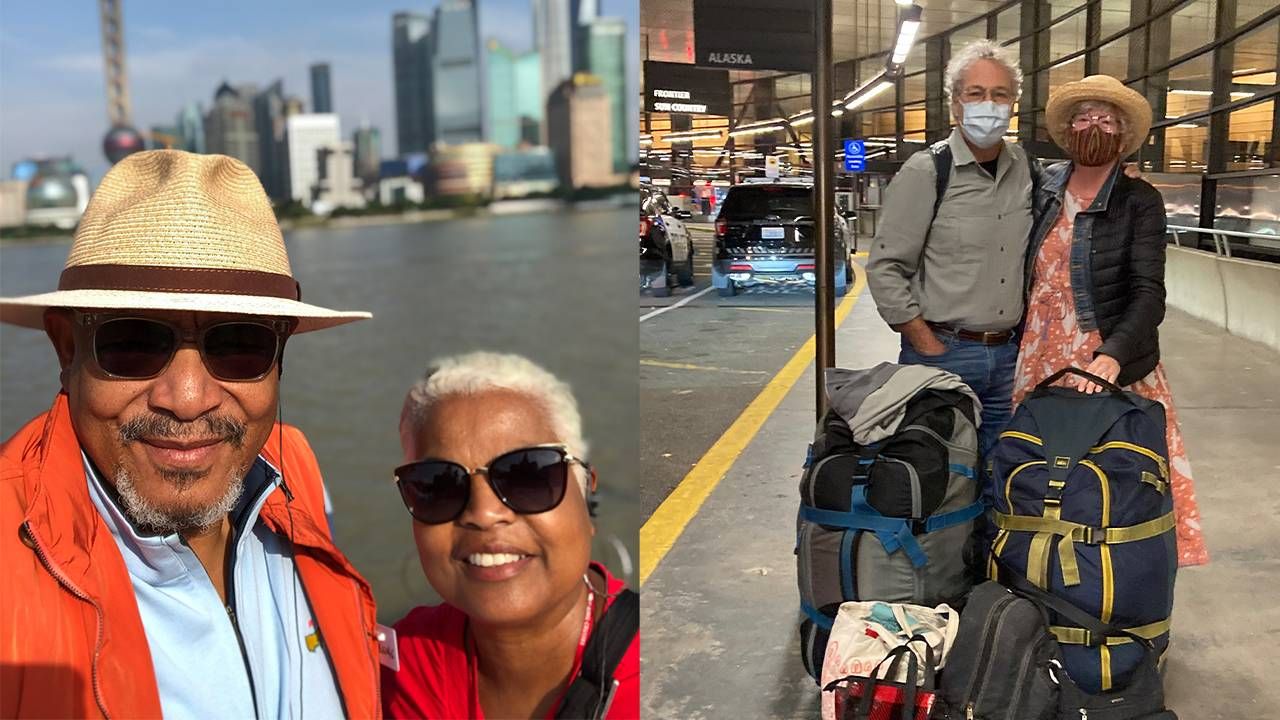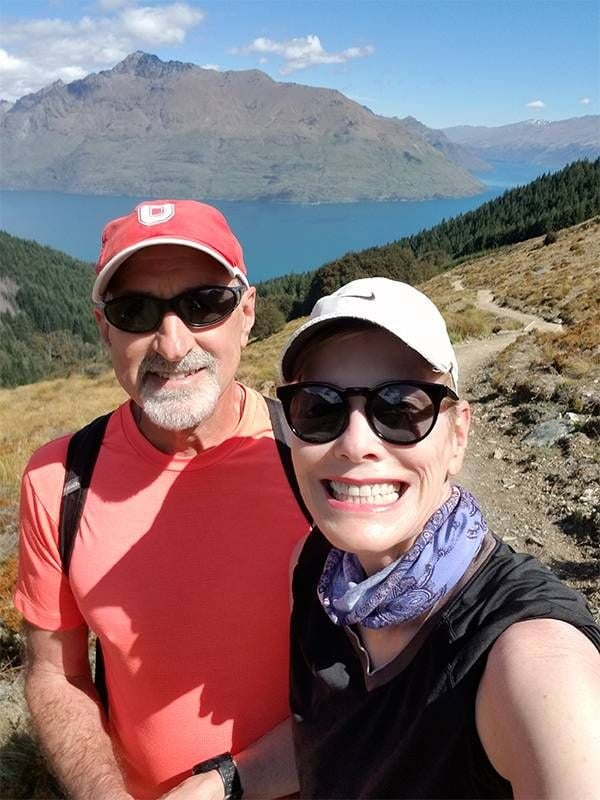How These 'Senior Nomads' (Sometimes) Traveled the World in the Pandemic
Even when full-time vagabonds were sidelined, they maintained their wanderlust
Reed Kimbrough, 70, a former Army pilot and management executive, and his wife Charlcye, 65, who worked in broadcasting and sales, traveled widely before he retired in October 2018 and she in March 2020. They leapfrogged from Colorado to New York City and internationally from China to South Africa. A year ago, they were considering a Tom Joyner cruise (he's a popular radio host who also hosts cruises) and a trip to Australia and New Zealand.

Then the pandemic upended their plans.
Disruptive? Sure, but the Kimbroughs were safe and healthy and still had their Atlanta home. So, they stayed stateside and plan to soon resume trips — domestically first. "We feel good now that we've been vaccinated," Reed says.
A Challenging Year for Global 'Senior Nomads'
Other older so-called "senior nomads" who gave up their U.S. homes and had the means to travel the world full-time in retirement have found the past year far more challenging.
Many found themselves stuck abroad as the pandemic spread and borders closed. They scrambled to adjust their travel plans and retirement dreams.
"It's so freeing not to have a home," Mary says. But, she adds, "Some people think we're nuts."
Mary Tipton Nixon, 64, and her husband, Ken, 69, sold their Michigan home and started their nomadic journey in February 2016. She'd worked in human resources, he as a systems engineer. The Nixons were in Australia when the pandemic began, planning to travel to Southeast Asia.
Instead, they headed to New Zealand, "where we had four weeks of strict, strict lockdown; no takeout, no nothing," says Mary. The Centers for Disease Control and Prevention (CDC) labels New Zealand's COVID-19 level "Low."
Our Commitment to Covering the Coronavirus
We are committed to reliable reporting on the risks of the coronavirus and steps you can take to benefit you, your loved ones and others in your community.
Read Next Avenue's Coronavirus Coverage
The Nixons have remained in New Zealand and "life is a hundred percent completely normal," Mary notes. They've been hiking regularly, grateful for their safety and determined to explore other countries when possible.
"It's so freeing not to have a home," Mary says. But, she adds, "Some people think we're nuts."
International travel, however, remains difficult. Most countries are on the U.S. State Department's Level Four "Do Not Travel" advisory list.
ReAnn Scott spent the first part of the pandemic holed up with an American friend in a Portuguese fishing village. When they planned to leave last summer, their flights were canceled; both frantically rebooked before eventually reaching their destinations.

Getting Restless
Scott moved to a house in San Miguel de Allende, Mexico, which — pre-pandemic— has been called the best place to retire in the world (the CDC says Mexico's COVID-19 level is currently "Very High").
Scott's still there but is restless. A retired entrepreneur, she spent the previous five years housesitting, petsitting and blogging in 34 countries.
"After a year of no travel, except to return to the States for my vaccination shots, I can't wait to get on a plane and fly away," she says.
Scott celebrated her 75th birthday in Mexico recently with friends including Debbie and Michael Campbell, 65 and 75, a Seattle couple whose blog and book "Your Keys Our Home" have helped popularize the senior nomad concept.
The Campbells retired from their careers in graphic design and sports marketing and began traveling in 2013. Since then, they've visited 85 countries from Africa to Australia, staying in more than 270 Airbnbs.
"We can't wait to get to Europe to see our family in France and visit the parts of Central Asia and Russia that we missed last year," says Debbie, who reports seeing similar optimism from others posting on the couple's Senior Nomads Facebook group page.
Other senior nomads who've been temporarily back in the U.S. hope it won't be the case for long.
Take Toni Farmer, 66, and her British husband Peter, 70. They lived and worked in Chicago; she as an executive assistant, he in international sales. A few years ago, after a friend died suddenly at 57, the Farmers made a dramatic life change for retirement despite limited savings. "Life is too short," Toni recalls them thinking. "We sold everything except a few suitcases and traveled the world."
Temporarily in Tennessee
They were housesitting in San Antonio, Texas when the pandemic hit and then leased a furnished house in Tennessee. Since the Farmers needed a permanent address for insurance and tax purposes and to renew Peter's green card, they ended up purchasing the place.
"Buying a house was not what we wanted to do but was the most practical and easiest," Toni says.
She is looking forward to new travels, from hiking the Carpathian Mountains to visiting Poland and Morocco but is wistful about being a homeowner again.
The COVID-19 pandemic has changed her outlook, though.
"That freedom of being a 'nomad' — never giving a second thought to whether the roof needs replacing or if tax assessments will increase — is forever gone," she says.
Other nomads have kept traveling internationally.
"We have been diligent about wearing masks and social distancing and felt that we were balancing minimizing health risks with still living our lives," says Iris Stone, 66.
Staying Flexible
Stone retired from a job at a large bank and her husband, Patrick, 71, ran a housecleaning franchise. During the early days of the pandemic, they cut short a trip to the Seychelles and went to South Carolina and Florida. Last summer, they began globetrotting again, first to the Caribbean, Central America and Mexico, then to Jordan, Egypt, Tanzania and, most recently, Croatia.
"This has been the first time in our years of being nomads that it would have been nice to have a home base to go to," Iris says. "We spent a lot of time keeping up with what the restrictions and requirements were, country by country. We were very flexible and just went to the places we were able to go."
"We have been diligent about wearing masks and social distancing and felt that we were balancing minimizing health risks with still living our lives."
Although she says travel has been "different" due to curfews and mask requirements and many noteworthy spots and events have been closed or cancelled due to COVID-19, "we have been very lucky to see sights like the Pyramids, tombs and temples of Egypt and Petra in Jordan with so few tourists — a once-in-a-lifetime opportunity."
Tom Allin and his wife Nancy, both in their early 70s, say they've been glad to be senior nomads abroad, despite the pandemic restrictions. Since 2016, they have spent much of their time abroad.
"Even with all the travel issues, we are happier traveling than sitting at home in front of the TV, eating and drinking ourselves into an early death," says Tom, who previously worked with large international construction companies. Nancy's a former medical librarian.
They recently visited Morocco, Turkey and Iceland, and are now in southern Africa.
Saving Money
Some senior nomads say they've been spending the same amount of money or less abroad than they would as American homeowners.
Rod Sedlacek, 70, a former federal employee who also worked in the construction industry, has ridden out the pandemic with his wife Rose, 66, in Costa Rica. He says: "Although Costa Rica is expensive by Latin American standards, we could never afford a similar lifestyle and location in the U.S."
The couple sold everything after they retired in 2018. "The nomad life seemed a natural fit," Rod says.
They traveled in Mexico, Europe and elsewhere and went to Costa Rica "quite by accident" in November 2019 to save money before returning to Europe. "Traveling to Costa Rica proved to be a monumental stroke of good fortune, though we could hardly have known it at the time," Rod says.
Ken Nixon said he and his wife have been offered holiday homes and free Airbnbs by New Zealand locals they've befriended. Ken says "medical insurance is cheaper" than in the U.S. for the two of them and "we have no car and no house."
All in all, many international senior nomads expect to continue their quest to see new places and meet new people.
"Full-time travelers are hard to keep in one place," notes Debbie Campbell. "Everyone is anxious to pick up where they left off."

